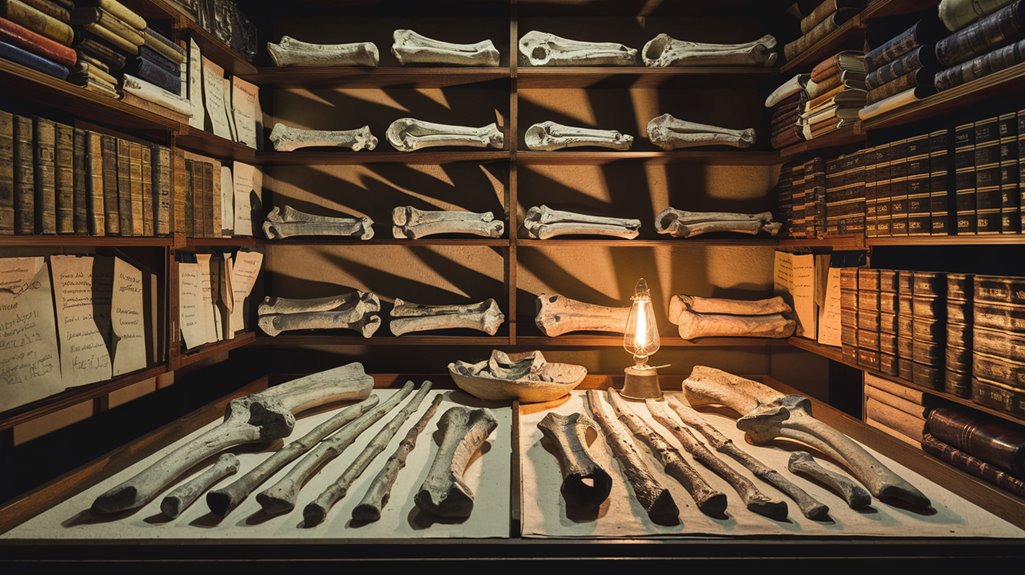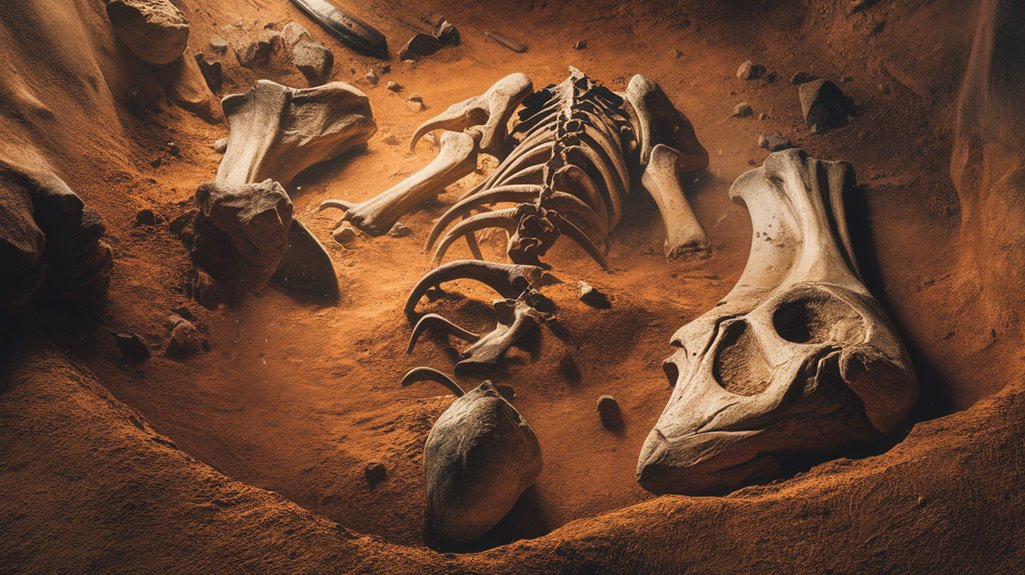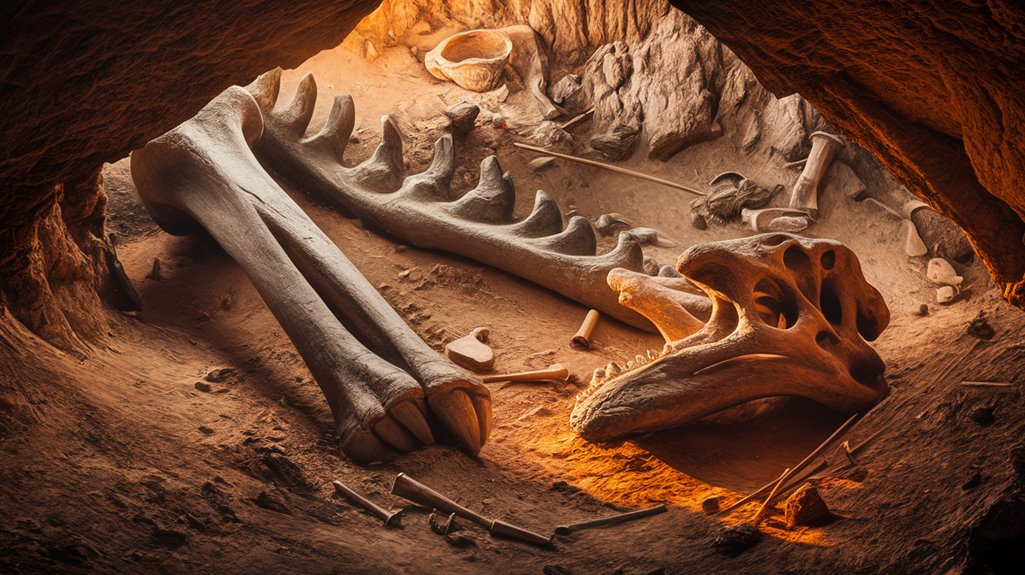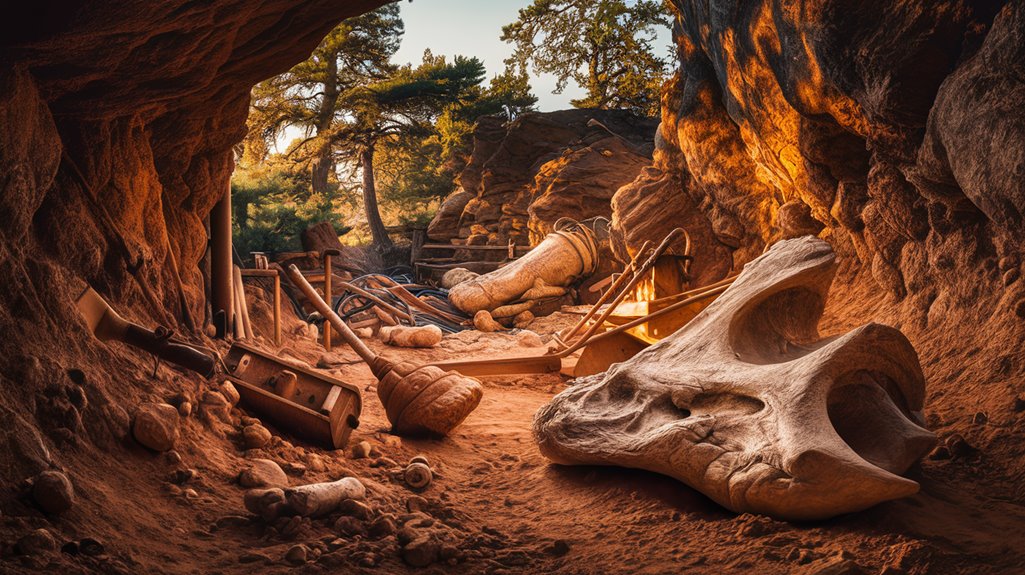The Bone Wars: The Bitter Feud That Shaped Paleontology
You've probably heard of the dinosaurs that shaped our understanding of prehistoric life, but do you know about the bitter rivalry that unearthed them? The Bone Wars of the late 1800s pitted two brilliant paleontologists against each other in a ruthless competition that would change science forever. What began as a friendship between Edward Cope and Othniel Marsh soon spiraled into a decades-long feud of discovery, deception, and destruction—and the dinosaurs weren't the only casualties.
From Friends to Foes: The Origins of the Bone Wars

During America's Gilded Age, two brilliant paleontologists transformed from friends to bitter rivals in what would become known as the Bone Wars.
Edward Drinker Cope and Othniel Charles Marsh's personal rivalry began innocently enough when Cope invited Marsh to join him at a New Jersey fossil hunting site in 1868.
What seemed like a friendly collaboration quickly soured when Marsh secretly struck a deal with a local collector behind Cope's back.
The betrayal ignited a fierce competition that would define paleontology for the next two decades.
Their competition led to the discovery of 136 new species of dinosaurs, forever changing our understanding of prehistoric life.
When Marsh publicly criticized Cope's incorrect reconstruction of the Elasmosaurus, their relationship deteriorated further.
The rivalry escalated as both men raced to claim fossil sites and publish discoveries, often using underhanded tactics to outmaneuver each other, setting the stage for their infamous feud.
Their divergent views on evolution drove them further apart, as Cope supported Neo-Lamarckism while Marsh aligned with Darwin's theories.
The Battle for Scientific Glory: Key Discoveries and Rivalries
Although the Bone Wars began as a personal feud, the rivalry between Cope and Marsh yielded an extraordinary scientific bounty of over 130 new dinosaur species. Their dinosaur discoveries included iconic specimens like Stegosaurus, Triceratops, and Allosaurus, with many being the first complete skeletons ever found.
The scientific rivalry drove both men to employ questionable tactics. You'll find tales of bribery, theft, and even the deliberate destruction of fossils to prevent their competitor from accessing them. Marsh leveraged his wealthy uncle's backing to outspend his rival in acquiring prime fossil sites. The fierce competition between them began after their meeting in Berlin, which transformed their initial collaboration into a bitter rivalry.
They rushed to publish their findings, often making mistakes in classification, as exemplified by Cope's infamous backward reconstruction of Elasmosaurus.
Despite their unethical methods, their contributions revolutionized paleontology, establishing it as a major scientific field and sparking public fascination with dinosaurs that continues today.
Sabotage and Scandal: The Dark Side of Competition
The intense desire for scientific dominance led Cope and Marsh down a dark path of sabotage and scandal.
You'd be shocked by their unethical practices, which included bribing workers to steal fossils and deliberately destroying specimens to keep them from rivals. Their sabotage tactics even extended to physical confrontations, with teams hurling stones at each other during excavations.
Their scandalous newspaper headlines quickly became the talk of the scientific community, damaging paleontology's reputation.
They didn't stop there.
You'll find records of them poaching each other's workers, publishing misleading information, and sending "dinosaur rustlers" on secret missions to plunder their opponent's sites. They'd spare no expense to undermine each other, leading to their financial and social downfall. The rivalry ultimately resulted in the discovery of 136 new species of dinosaurs.
Both scientists damaged their reputations within the academic community, leaving behind countless unopened fossil boxes as evidence of their obsessive rivalry.
Legacy of the Great Dinosaur Rush
Despite their bitter rivalry and unethical practices, Cope and Marsh's fierce competition yielded remarkable scientific advances during America's Golden Age of Paleontology.
Their dinosaur discoveries transformed our understanding of prehistoric life and established paleontology as a respected field of study.
You'll find their legacy continues to influence science today through:
- The description of over 130 new dinosaur species, including Allosaurus and Stegosaurus
- The creation of extensive fossil collections that researchers still study
- The development of improved excavation and preservation techniques
- The spark of public fascination with dinosaurs that endures today
- The foundation of scientific methods that led to modern theories about extinction
Even their mistakes and rushed publications taught valuable lessons about the importance of careful, methodical research in paleontology, shaping how you understand dinosaur science today.
Impact on Modern American Paleontology

Modern American paleontology continues to feel reverberations from the Bone Wars, as both its triumphs and failures shaped today's scientific practices.
While the feud's destructive aspects – including bribery, theft, and site destruction – taught valuable lessons about what not to do, you can't ignore its contributions. The Smithsonian and Yale received their massive fossil collections, creating permanent research resources for future generations.
The discovery of over 136 dinosaur species and the creation of extensive fossil collections have provided an invaluable foundation for contemporary research.
Their intense competition, though damaging, led to the discovery of significant dinosaurs like Allosaurus and Triceratops that revolutionized our understanding of prehistoric life.
Today's paleontological standards emphasize careful documentation, preservation of sites, and collaborative research – direct responses to the Bone Wars' shortcomings.
The period's lasting impact serves as both a cautionary tale and a catalyst for professional reform in scientific practice.











